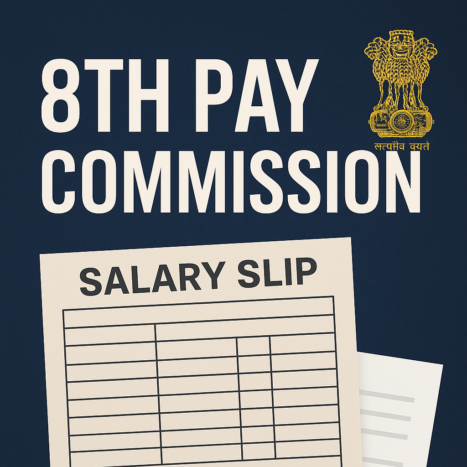📰 8th Pay Commission Expected to Take Effect from January 1 — But Will It Boost Your Salary?
A major development has brought cheer to around 50 lakh central government employees and 69 lakh pensioners — the Central Government has approved the Terms of Reference (ToR) for the 8th Central Pay Commission (CPC), officially setting in motion the next major pay and pension revision.
The commission, headed by former Supreme Court judge Justice Ranjana Prakash Desai, is tasked with submitting its report within 18 months, and its recommendations are likely to be implemented from January 1, 2026.
Announcing the move, Union Minister Ashwini Vaishnaw said, “The exact date of implementation will be finalized after receiving the interim report, but it is most likely to be January 1, 2026.”
The announcement — just ahead of the Bihar assembly elections on November 6 and 11 — has drawn significant attention, given its direct impact on millions of government employees and pensioners nationwide.
📘 What Are the Terms of Reference (ToR)?
The Terms of Reference (ToR) act as the guidelines or framework that define the commission’s duties, scope, and deadlines. They specify what the panel will study, which data it should evaluate, and by when it must submit its findings.
For the 8th CPC, the ToR have been finalized after detailed consultations with multiple stakeholders — including ministries, state governments, and staff associations.
🔍 Key Focus Areas of the 8th Pay Commission
As per reports, the 8th CPC will examine several factors to ensure a fair and sustainable pay structure. The main focus points include:
-
Assessing the current economic situation and maintaining fiscal prudence.
-
Ensuring enough resources remain available for development and welfare programs.
-
Reviewing the cost implications of pension schemes.
-
Evaluating how the pay revisions might affect state government finances, since many states adopt the Centre’s recommendations.
-
Comparing the pay, perks, and working conditions of central employees with those in public sector undertakings and private companies.
The commission’s primary goal is to balance fair compensation for employees with the government’s financial sustainability.
👥 Who’s on the 8th Pay Commission Panel?
The commission is chaired by Justice Ranjana Prakash Desai, with IIM Bangalore professor Pulak Ghosh as part-time member and Petroleum Secretary Pankaj Jain serving as member secretary.
Justice Desai, who also heads the Press Council of India, has led several national panels — including the Delimitation Commission for Jammu & Kashmir and the Uttarakhand Uniform Civil Code (UCC) committee.
🗓️ Timeline and What to Expect
If the process follows the usual pattern, the revised pay scales will be applicable from January 1, 2026, after the final recommendations are approved — continuing the decade-long cycle seen since the First Pay Commission.
For context, the 7th Pay Commission was constituted in 2014 and came into effect from January 1, 2016.
Until the new structure is implemented, employees will continue to receive Dearness Allowance (DA) revisions twice a year to help offset inflation.
💰 What It Means for Employees and Pensioners
The 8th Pay Commission is expected to bring:
-
Higher basic salaries and revised allowances
-
Increased pensions for retirees
-
Upgraded benefits and revised pay structures
It will likely influence state government pay revisions as well, since most states typically align their pay scales with the Centre’s.
While the exact salary increase will only be known once the report is submitted, the approval of the ToR confirms that the long-awaited process for the next pay revision cycle has officially begun.

